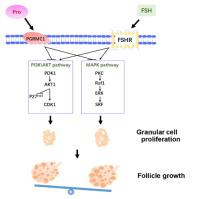Journal of Advanced Research ( IF 10.7 ) Pub Date : 2021-03-02 , DOI: 10.1016/j.jare.2021.02.008 Hui Long 1 , Weina Yu 1 , Sha Yu 1 , Mingru Yin 1 , Ling Wu 1 , Qiuju Chen 1 , Renfei Cai 1 , Lun Suo 1 , Li Wang 1 , Qifeng Lyu 1 , Yanping Kuang 1

|
Introduction
As an effective inhibitor of premature ovulation, progestin was introduced to a novel ovarian stimulation regimen for infertility treatment. However, the local action of progestin on the ovary and its effect on clinical outcomes have not been described.
Objectives
The influence of progesterone administration on clinical oocyte outcomes and the mechanisms involved in the coordination of progesterone and follicle stimulating hormone (FSH) on follicle growth and oocyte yields were investigated.
Methods
Clinical outcomes of patients undergoing ovarian stimulation for in vitro fertilization were analyzed. The murine ovarian stimulation model and follicle culture system were used to evaluate the effects of progesterone on oocyte yield, follicle development, granular cell proliferation, and hormone secretion. Phospho-specific protein microarrays were used to explore involved signaling pathways.
Results
Progesterone decreased clinical oocyte yields, and yields were rescued with an increased dose of human menopausal gonadotropin. Administration of progesterone inhibited murine granular cell proliferation and reduced the growth rate of follicles; both of which were rescued by FSH. The phosphatidylinositol-3 kinase (PI3K)/protein kinase B (AKT) and mitogen-activated protein kinase (MAPK) were identified as pivotal signaling pathways to integrate progesterone into the FSH signaling network in granular cells.
Conclusion
Progesterone inhibited granular cell proliferation and antral follicle growth during ovarian stimulation, and subsequently influenced oocyte outcomes in the clinical setting. Progesterone coordinated with FSH to regulate follicle growth through PI3K/AKT and MAPK signaling pathways. These findings advance our knowledge regarding the ovarian response to gonadotropins during progestin-primed ovarian stimulation and create an opportunity to manipulate individual oocyte yields.
中文翻译:

孕酮通过 PI3K/AKT 和 MAPK 通路与促卵泡激素协调影响临床卵母细胞产量
介绍
作为一种有效的过早排卵抑制剂,孕激素被引入用于治疗不孕症的新型卵巢刺激方案。然而,尚未描述孕激素对卵巢的局部作用及其对临床结果的影响。
目标
研究了孕酮给药对临床卵母细胞结果的影响,以及孕酮和促卵泡激素 (FSH) 对卵泡生长和卵母细胞产量的协调机制。
方法
分析了接受卵巢刺激以进行体外受精的患者的临床结果。小鼠卵巢刺激模型和卵泡培养系统用于评估孕酮对卵母细胞产量、卵泡发育、颗粒细胞增殖和激素分泌的影响。磷酸特异性蛋白质微阵列用于探索相关的信号通路。
结果
黄体酮降低了临床卵母细胞的产量,而增加剂量的人绝经期促性腺激素可挽救产量。黄体酮给药抑制小鼠颗粒细胞增殖并降低卵泡生长速度;两者都被FSH救出。磷脂酰肌醇 3 激酶 (PI3K)/蛋白激酶 B (AKT) 和丝裂原活化蛋白激酶 (MAPK) 被确定为将黄体酮整合到颗粒细胞中 FSH 信号网络的关键信号通路。
结论
孕酮在卵巢刺激期间抑制颗粒细胞增殖和窦卵泡生长,并随后影响临床环境中的卵母细胞结果。孕酮与 FSH 协同通过 PI3K/AKT 和 MAPK 信号通路调节卵泡生长。这些发现提高了我们对孕激素促排卵期间卵巢对促性腺激素反应的认识,并创造了操纵个体卵母细胞产量的机会。

























 京公网安备 11010802027423号
京公网安备 11010802027423号